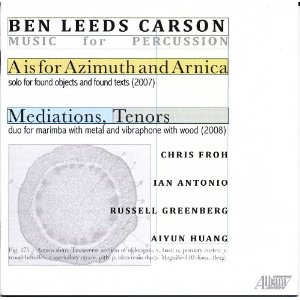Imagine, if you will, that you are a composer. Not a historical composer, mind you — we’re not talking powdered wigs and candelabras here — but a composer living and writing music in the world today. You write a piece that deals with concepts and materials that inspire you and are important to you, and you find musicians willing to play it, and play it well. So get your piece recorded and released, eager to share it with the world!
Then you learn that some reviewers have taken the time to listen to your CD and write about it. In your heartwarming optimism and innocence, you look forward to reading these reviews, eager to see how sensitive, intelligent and dedicated music aficionados will respond to your work.
Be afraid, little composer, be very afraid.
One of the things I love about contemporary classical music today is the broad range of musical styles that coexist, more or less peacefully, side by side along the contemporary spectrum. If you know where to look, you can find just about anything you can think of (and several things you probably haven’t). Some of this music is experimental, conceptual, complex, and challenging to listen to, particularly if you approach it with the expectation that it will be similar to older styles of classical music. Because there is so much going on now, it’s pretty difficult to stay on top of it all, and it can be disorienting to hear, let alone try to evaluate, music that confounds your expectations and asks you to go beyond what you’re familiar with.
In short, music critics do have their work cut out for them. However, I think a piece of music deserves to be evaluated on its own terms, and when that doesn’t happen, I get annoyed.
What, you want examples? Okay, I’ll give you examples!
Composer and music theorist (and grad school colleague of mine) Ben Leeds Carson recently shared his frustration with me over reviews of a CD of his works for solo percussion. One of the works, A is for Azimuth and Arnica, is an experimental work in which the player is given sections of precisely notated music along with instructions and a sort of musical map. The performer is asked to make choices about the order of musical events, with the idea that no two performances will be exactly alike. To amplify that concept, the CD contains five different interpretations of the score by five different percussionists. Here’s a video of one of the performances, and there are excerpts from the others further down that page.
Now, here are some excerpts from the reviews:
A is for Azimuth and Arnica belongs to that style of indeterminate or quasi-improvised music in which the composer specifies a series of actions, rhythms, and instruments that are then combined to create the finished work. In my more facetious moments, I think of this as the Chinese restaurant menu approach to composition: Take one from column A, two from column B, stir, and voilà, instant music!” (Robert Schulslaper, “Feature Review: Carson: A is for Azimuth and Arnica. Meditations, Tenors.” Fanfare 34:5, May/June 2011, subscriber link)
You know, I love good snark even more than the next gal, but I fail to see the utility of this cute little metaphor. If Mr. Schulslaper is, himself, a composer — someone who puts the product of his creativity out there to be judged — he should know better than to be so facile. And if he is not, he should definitely know better. Composers make themselves pretty vulnerable when they share their music, and respect for that ought to be job one for a critic.
Later in the review, in reference to another percussion piece on the same CD, we find the following pearl of wisdom:
[T]he marimba and vibraphone are pitched instruments, so any set of notes can’t avoid being perceived as having a melodic shape. Still, don’t expect Puccini.
Friends, if you set down to listen to a recording of recently composed music for solo percussion and need to be told not to expect Puccini, you need far more help than this reviewer (or your humble blogger, for that matter) is able to provide.
Let’s try another, shall we?
Players are invited to sing, or chant. For percussion music, there is a disconcerting lack of regular, pulsing rhythm. Things never go especially loud. The pitched instruments, at least on this version, suggest an Asian harmonic influence. It is hard to describe the music much beyond this. It’s a non-starter for traditional music lovers, who can happily stick to Tchaikovsky. (Peter Burwasser, “Feature Review: Carson: A is for Azimuth and Arnica. Meditations, Tenors.” Fanfare 34:5, May/June 2011 subscriber link)
I’ll grant you, it can be hard to describe a piece of music verbally. But the fact that the reviewer is so adept at describing what’s not going on in the piece makes me suspect that he simply didn’t feel like trying.
And again with the references to a random historical composer who is conspicuously not noted for solo percussion works? Look, I get it, some people just don’t dig modern music. But these kinds of comparisons are the musical equivalent of going to a Chinese restaurant (since we’re on the topic) and complaining that the minestrone tastes funny. It’s no less unfair to the traditional composers, by the way — as if their music were not also challenging in its own way. As my musicianship professor John Swackhamer used to say when students complained about the complexity of modern music, “Do you think you understand Beethoven?”
In short, I don’t think it’s too much to ask that a reviewer a) know something about and b) not be demonstrably antagonistic toward the type of music under consideration. My little pipe dream, since I am a composer myself, would be that criticism come in the form of identifying ways that the music could do a better job of being what it’s trying to be — suggesting ways to fill in what might be missing. A review that uses a single piece as one more example of why the reviewer dislikes an entire category of music is of no use to anybody; listeners who already dislike the style don’t need to be told why, and listeners who might be interested are unlikely to find any helpful insights amid the antagonism.
So the big question, then, is: can Miss Music Nerd do any better? Well, I like to think so. I decided to bounce my thoughts off of the composer to see if my feedback might be slightly more useful than the comments above. Here’s our conversation:
MMN: I was on the fence about how to dive into this topic. I was wondering if it was okay to reference these reviews as counter-examples – “Here’s how not to write a review.” I don’t want to be nasty, but I really feel like these listeners did not in any sense have any willingness to try to go where you were going.
BLC: Not being heard on my own terms is something I have to live with, often, because these days, artists all have different ‘terms.’ In this case, however, I was concerned that the writers were claiming to review my CD, and instead, they were reviewing decades of music written between 1955 and the present, and lumping it all together. They were writing their reactions the whole idea of indeterminacy, the whole idea of pulselessness, the whole idea of resisting traditional Western ideas of melody, rather than commenting on the particular results of those ideas in my own work. What they said was fine, but the reviews shouldn’t have pretended to be about me, if they were really about Cage and Feldman, or ‘Asian music.’
MMN: I’ve been in the same academic environment as you, and part of me rejects it, but I’m open musically in ways that someone who had never been in that environment might not be. So I am willing to go there.
But I’ve been away from academia for a while now, and I think that I might come across to some people as anti-academic. I don’t think of myself as anti-academic, although I have baggage around it, and I have snarky things to say about it. So I might very well say something that sounds really anti-intellectual and ignorant, and I apologize in advance for that.
BLC: Go for it!
MMN: In your introduction to the score of A is for Azimuth and Arnica, you say, “Here are thoughts on this score’s tentative status as a composition: its possible differences and similarities from other scores that are called compositions.” As a listener, I get a little bit impatient with that kind of inquiry, because I guess if I’m going to listen to a piece, I want the composer to have made up his mind, even if only temporarily. What I want is, “Here’s a position that I’m standing in right now, and here’s what is coming out of that.”
In your instructions, I feel like you are being very careful to provide space for the performer to be a co-creator, to provide freedom and a way for it to be an inquiry and not a dictated, “Here is my work of genius” kind of thing. And I appreciate that, because I also resent the whole, “I am a genius composer and you will be in awe of me.” That whole thing is annoying in its own way, too.
But as I was listening to the performances, what I finally realized — and this was a breakthrough for me, because I’ve had this feeling with a lot of pieces without being able to put it into words — what I realized is, I could hear the commitment of the performers. I could hear how they were invested in it, because they had to learn the specifically notated music and also make their choices about how they were going to order the sections, and all of that, and it really came across, even though the music is not necessarily dense or super complex. You could hear the intensity of it. But…
BLC: But?
MMN: But, when I go and hear a Mahler symphony, for example, I can hear the commitment of the performers , and I can hear the intensity of it, and I am swept away by the experience emotionally. With your piece, I feel like I am observing the performer having an intense experience, but it does not translate into me having an intense experience, too. So I kind of feel like a voyeur instead of someone who is able to emotionally connect.
BLC: Well, I think that’s a marvelous way of distinguishing what I’m trying to do from what Mahler’s trying to do. I think with that distinction, you have actually understood part of what I meant by the phrase that these are not compositions in the usual sense implied when a score is said to be a composition.
I didn’t intend to be quite as evasive as I think I seemed to you, because following that statement, I then make a number of statements that are more affirmative about exactly what I mean by “composition” here. You seem to have taken primarily the message that I am leaving something out or releasing my grip, so that a performer can then invest something. Although that’s also true, it’s not the primary goal. That’s not what I mean to convey with this little paragraph about composition.
What I mean to convey there is, I started to love the word, “composition,” as it occurs outside of music. Imagine what music would be like if it were a soil composition or a population composition, or the composition of a dynamic weather process. It really resonated with me to just think etymologically about composition for a minute.
After having five, and now six or seven, different people play this piece, I’ve started to get, in my ears, a kind of naturalist’s love of these performances, that you might have as a bird watcher, or a hiker who was wondering whether the population of, oh, I don’t know, cyclamen, had gone up or down on the north side of bridges or something like that. You know, just fascinated by the flow of data through a landscape. I see these different performances as repeated visits to a forest, with some consistency of observation about what the forest is made of, but then all this variety as well. So when you talk about it as a voyeuristic experience, actually that has a very sweet feeling.
MMN: Well, that’s good!
BLC: With some of my music, I’ve actually wanted people to feel voyeuristic. A lot of my music is very quiet, and sometimes I think that encourages people to listen as they would to someone’s daydream — hopefully not uninvited, but — as they might read a diary, or a memoir or something like that. I mean, I get the negative connotations of voyeurism, feeling someone’s privacy’s been invaded…
MMN: Maybe that’s not the right word, because it’s not that I feel I’m invading anyone’s privacy; it’s more that I feel like I am watching the concert through a window, from outside, thinking, “Wait a minute, I want to come in!” But I can’t.
BLC: I see. A little bit excluded. You feel the performer’s commitment, but it’s not sweeping you up into it.
MMN: Yeah. I don’t emotionally engage with it. I appreciate everything about the accomplishment of what’s going on, but I end up feeling a little bit forlorn and abandoned.
BLC: Yeah, I can imagine that.
MMN: The thing is, having liberated myself from academia, I am no longer ashamed to say that I want to be able to hear a piece of music and say, “I love that piece because it’s beautiful!” and not have to say something intellectual about it.
BLC: I’m not sure if you were ever ashamed to say that!
MMN: Well, I thought I needed to be, and I don’t anymore!
BLC: Okay. Well, I will say that I still got something worthwhile about your comparison of this piece and Mahler and the phrase “swept up.” I’m pretty sure that I don’t want to sweep people up with this music. In most of the music I’ve written in the last fifteen years, for better or for worse, I have believed that understatement and sparsity and narrow ranges of behavior will, for some listeners, serve as an invitation.
Whereas you felt excluded, or not quite able to get into the feeling the performer had, it is my hope that some people will respond to the experience of privateness and smallness with a feeling of safety, a feeling of, “It is safe for me to listen closer. It is safe for me to think about time intervals on a micro scale in a way that wouldn’t otherwise be rewarding or inviting, but here, because of the smallness of the world, and because it is only moving in small ways, even when occasionally the notes are quite loud, the sense of movement is small; the sense of change from one moment to the next is small. And because of that smallness, I as a listener can begin to attend to issues and questions that otherwise would have been impossible.”
And I know that for some listeners, those issues and questions will never come up in the first place, so in that sense I can very well imagine it not being inviting. But I hope that for some listeners, for example, one could listen to six or seven notes striking metal and think, “What was happening to the pulse there? Why was it neither slowing down nor speeding up, but rather moving from a feeling of regularity to a feeling of irregularity without any fluctuation?” That kind of observation occurs rarely for listeners, but I hope not too rarely.
To put it in non-academic terms, “I suddenly felt like tapping my foot, but only for a minute. And then, why did I stop? Because what happened next was also interesting, but different.” I imagine some listeners taking on that narrative in their own heads — not in the performer’s head, but in their head as listeners, and enjoying the minute fluctuations that happen conceptually because of it.
MMN: Yeah, and here’s where I wonder what my experience would have been like if I had just listened to it without reading any of the text or looking at the score. Because I guess knowing that the process of preparing a performance had a lot to it, more than just reading a score, I somehow wanted to be able to perceive some of that when I listened to it. And I couldn’t, so I was left kind of puzzled.
BLC: Yeah, I can imagine that being a little disappointing. In some ways, the performances are not very different. Aiyun Huang actually said, “I’m concerned that our interpretations don’t really show breadth that’s possible with this score.” And a number of other people have said that, based on the concepts I was producing, they expected that I would be creating this sort of mini-technology by which people could create radically different rent performances that would spin off in really interestingly different directions. That would be really cool.
I actually want someone to write that piece, but that’s not what I wrote. It is a composition — it is one composition; it’s not an opportunity for music. It’s not quite as liberating as it sounds if you’re reading it through the lens of Cage. It sort of resembles, when you read that prose of mine, “Oh, he’s kind of doing a little bit of what Cage did. He’s not as determinate.” There’s a little bit of that, but it’s not that liberating. It is one composition, and it is a very specific description.
For me, it’s inspired by biology; it’s a very particular way that I feel about azimuth, in the context of arnica. I really love the rhizomatic movements of the root systems of arnica, and I didn’t want any performance to be about something else. I didn’t want any performance to have a different feeling than that.
MMN: Well, if you wanted to spin it positively, you might say that the fact that the interpretations aren’t so different means that the performers got it, got where you’re coming from.
BLC: I don’t mind that positive spin — that sounds great!
MMN: I guess I did have the impression that you were wanting to create more freedom than you said you were, and it reminds me of something that I always found frustrating in trying to produce academic writing: I felt I could never just make a statement without qualifying it and preemptively anticipating all of the possible objections to it.
BLC: Defending it. Yeah, I know the feeling.
MMN: So, with some of the sentences, I wanted to say, “Just tell me what you’re gonna do! Just tell me what you want this to be about!”
BLC: Yeah. The only problem with that is, just imagine for a second, the program note where I say, “I was inspired by the rhizomatic movements of the root systems of arnica plants.” Maybe that would have been better, but I read a lot of program notes like that, and to me, it really dampens my musical experience, truly. Titles inspire me, because they dangle a concept. I guess where I really want to give some freedom is to the listener, even more than to the performer. I don’t like the trend of composers having music that is about really special scientific or academic subtleties.
It doesn’t make the music more subtle; it doesn’t make the music more of an intellectual experience for me. I know that I felt profoundly musical when I thought about rhizomatic root systems, and there was a temptation to talk about that. But I felt that it would really diminish the possibility that someone else would feel musically.
What I want is for you to possibly have a glimpse of the musicality that I felt — not for you to have the thoughts that I thought. So I made that choice. I’ve definitely chosen in the other direction; you know, I’ve written program notes that are very ornate and specific about what inspired me. On this particular occasion, I decided to let the music be rhizomatic, instead of to try to convince people to think about rhizomatic biology while listening.
MMN: I can understand that. I think that it’s definitely tricky, because you could have written that program note, and then somebody would sit there and think, “Well that’s not how rhizomatic root movement sounds to me!” Which is a completely stupid argument to even contemplate having.
BLC: The other reason I didn’t talk about rhizomes in the CD jacket is because I wrote that in 2007, and then in 2008 and 2009, there were, like, six new books about Deleuze and music. Deleuze is a philosopher who talks about rhizomes, and it suddenly became very, very tiresome, the number of people who were using Deleuze in their discussions about music. I’m not shy about it — I’ll be the first to admit that Deleuze is a philosopher I find very inspired, and his fame is justified. It’s powerful stuff. But I did not want to just be folded into what’s become known as Deleuzian musical thought. That would have bothered me.
MMN: Having been removed from the academic environment, I have mixed feelings about the whole approach of writing a piece of music that is a piece of music, but at the same time asks questions about what a piece of music is, and can be, because I feel like the fact that that inquiry is going on can get in the way of it just being a piece of music. And part of me wants it just to be a piece of music, and not have to have an inquiry at the same time. Part of me wants to leave the seminar table behind and just hear a piece of music.
BLC: Well, I would say that there’s a difference between the desire of an artist to question the sort of normative limits of musical experience on the one hand, and on the other hand to be at a seminar table. I think those are two different things.
Erik Satie wrote pieces that really raised questions for people about what it meant to have a piece of music in front of you, or to hear something that was to be called a piece of music — some questions that were very difficult for people. It wasn’t the kind of avant garde thing where people were cussing and saying, “Oh, it’s noise, it’s nonsense.” But they were saying, “Why didn’t you finish that piece? Where’s the melody? Are you warming up? What is going on here?” It wasn’t a seminar conversation.
The reason that distinction’s important in the context of what you’re saying is that for Satie, at least, it didn’t get in the way of being just a piece of music. It maybe took a while before the vast majority of us could hear as just a piece of music. But now, although we still admire the formal peculiarities of his phrases, and we still admire his wit and we know he’s winking at us, it can also just be a piece of music.
I don’t know if I’ve managed to be experimental in a way that will be valuable or even that people might at some part of the world or in some subculture would say, “Oh, I just like that piece.” But I think there are people who would just think of A is for Azimuth and Arnica as just a piece, and be able to hear it like that. And maybe someday there would be a much broader segment of the population that could hear it as just a piece, regardless of whether they liked it or not.
MMN: Is that a goal for you, or is it just something that would be a happy accident?
BLC: I do want people to be able to just hear the music. I think that there may be a subculture of people who could listen to it over dinner, and that would make me happy. I don’t know if someone could be effective in a workout video to this music, but to listen to it on an exercise bike or something — I think that would be cool.
MMN: What, in general do you want a listener to bring to your music, and alternatively, to get out of your music?
BLC: I like listeners to bring to my music a readiness to try to hear in a different way. I am an experimental composer, which means I’m asking questions; I’m asking what’s possible. And I’m interested to know, what are the limits of feeling that something is coherent without pulse? I’m interested to know whether what we always assume about musical unity actually has to be the case in order for things to be unified?
I don’t want my listeners to have the same questions I have, but I want them to know that I’m asking questions about music, and I’m deliberately pushing some of the boundaries about what we normally consider to be musical. I want them to be ready to be there on those boundaries with me.
What I want them to get out of it is, I want them to find it beautiful. It’s a very good question you’re asking, because I don’t think you can get that thing out of it without being there in that space of readiness. Once a listener is there on the boundaries and ready to be experimental with me, I believe that they’ll actually get some very conventionally musical things, like development of ideas, and surprise, and lyricism, definitely. That would be the one thing that I think maybe people could get even without being willing to be on the boundary. I think that in spite of all of the walls that I’m pushing, I think my music remains lyrical; it remains phrased, and melodic even when it’s not pitched.
MMN: I think that’s true. I agree that your music is very lyrical, and this piece particularly is very delicate and beautiful. I still have this feeling that there’s something I want that’s not there, but that’s just me!
BLC: Well, I’m very gratified by your attention to the piece, and both categories of your response are quite valuable to me.
MMN: My pleasure!






